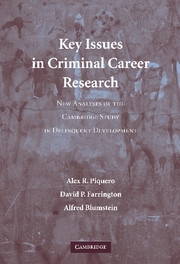 Key Issues in Criminal Career Research
Key Issues in Criminal Career Research Published online by Cambridge University Press: 30 July 2009
In The Great Instauration, a work published in 1620 that heralded the coming of science as the dominant arbiter of truth, Sir Francis Bacon proclaimed that the measure of a science was how much it contributed to the alleviation of the miseries of mankind. While we sometimes debate the role that science can and should play in forming public policy, there is no doubt that the goal of science is to improve understanding to enhance control. This is very clear in the scientific study of crime where from the beginning the goal has been to understand the distribution and occurrences of crime so as to identify ways through which such behavior could be prevented and controlled. That is why understanding of the “criminal career” – its beginning, its ending, and the kinds of events that occur in between – is such an important endeavor. This is especially true for those whose criminal involvements are extreme even by the standards of those who commit serious crimes – the “career criminals” who make a career out of serious criminal behavior. This focus on the extreme criminal, in part, explains why early criminologists so easily accepted the notion that the only criminals of consequence are those who have been identified by the criminal justice system. They understood that there were other criminals and crimes that the criminal justice system did not frequently encounter, but they also understood that the crimes that most directly contributed to the miseries of mankind were those that were the focus of the criminal justice system.
To save this book to your Kindle, first ensure [email protected] is added to your Approved Personal Document E-mail List under your Personal Document Settings on the Manage Your Content and Devices page of your Amazon account. Then enter the ‘name’ part of your Kindle email address below. Find out more about saving to your Kindle.
Note you can select to save to either the @free.kindle.com or @kindle.com variations. ‘@free.kindle.com’ emails are free but can only be saved to your device when it is connected to wi-fi. ‘@kindle.com’ emails can be delivered even when you are not connected to wi-fi, but note that service fees apply.
Find out more about the Kindle Personal Document Service.
To save content items to your account, please confirm that you agree to abide by our usage policies. If this is the first time you use this feature, you will be asked to authorise Cambridge Core to connect with your account. Find out more about saving content to Dropbox.
To save content items to your account, please confirm that you agree to abide by our usage policies. If this is the first time you use this feature, you will be asked to authorise Cambridge Core to connect with your account. Find out more about saving content to Google Drive.